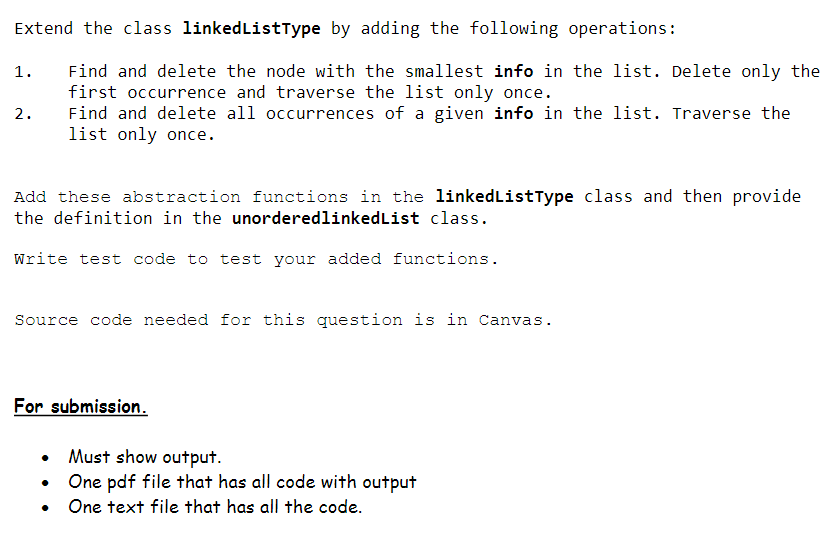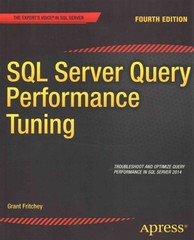Question
// Unorderded LinkedList program // // What was modified on March 28 2018 // Templating removed so info in the node is of type int

// Unorderded LinkedList program
//
// What was modified on March 28 2018
// Templating removed so info in the node is of type int
// Iterator class removed
// Operator overload for == removed
#include
using namespace std;
//Definition of the node
//--------------------------------------
struct nodeType
{
int info;
nodeType *link;
};
//-- End Definition of a Node
//***************** class linkedListType ****************
//------------------------------------------------------------
class linkedListType
{
public:
void initializeList();
//Initialize the list to an empty state.
//Postcondition: first = nullptr, last = nullptr,
// count = 0;
bool isEmptyList() const;
//Function to determine whether the list is empty.
//Postcondition: Returns true if the list is empty,
// otherwise it returns false.
void print() const;
//Function to output the data contained in each node.
//Postcondition: none
int length() const;
//Function to return the number of nodes in the list.
//Postcondition: The value of count is returned.
void destroyList();
//Function to delete all the nodes from the list.
//Postcondition: first = nullptr, last = nullptr,
// count = 0;
virtual bool search(const int& searchItem) const = 0;
//Function to determine whether searchItem is in the list.
//Postcondition: Returns true if searchItem is in the
// list, otherwise the value false is
// returned.
virtual void insertFirst(const int& newItem) = 0;
//Function to insert newItem at the beginning of the list.
//Postcondition: first points to the new list, newItem is
// inserted at the beginning of the list,
// last points to the last node in the list,
// and count is incremented by 1.
virtual void insertLast(const int& newItem) = 0;
//Function to insert newItem at the end of the list.
//Postcondition: first points to the new list, newItem
// is inserted at the end of the list,
// last points to the last node in the
// list, and count is incremented by 1.
virtual void deleteNode(const int& deleteItem) = 0;
//Function to delete deleteItem from the list.
//Postcondition: If found, the node containing
// deleteItem is deleted from the list.
// first points to the first node, last
// points to the last node of the updated
// list, and count is decremented by 1.
linkedListType();
//Default constructor
//Initializes the list to an empty state.
//Postcondition: first = nullptr, last = nullptr,
// count = 0;
linkedListType(const linkedListType & otherList);
//copy constructor
~linkedListType();
//Destructor
//Deletes all the nodes from the list.
//Postcondition: The list object is destroyed.
protected:
int count; //variable to store the number of
//elements in the list
nodeType *first; //pointer to the first node of the list
nodeType *last; //pointer to the last node of the list
private:
void copyList(const linkedListType& otherList);
//Function to make a copy of otherList.
//Postcondition: A copy of otherList is created and
// assigned to this list.
};
// -- End declaration of class
//--Definitions of Constructors and functions
bool linkedListType::isEmptyList() const
{
return (first == nullptr);
}
linkedListType::linkedListType() //default constructor
{
first = nullptr;
last = nullptr;
count = 0;
}
void linkedListType::destroyList()
{
nodeType *temp; //pointer to deallocate the memory
//occupied by the node
while (first != nullptr) //while there are nodes in
{ //the list
temp = first; //set temp to the current node
first = first->link; //advance first to the next node
delete temp; //deallocate the memory occupied by temp
}
last = nullptr; //initialize last to nullptr; first has
//already been set to nullptr by the while loop
count = 0;
}
void linkedListType::initializeList()
{
destroyList(); //if the list has any nodes, delete them
}
void linkedListType::print() const
{
nodeType *current; //pointer to traverse the list
current = first; //set current so that it points to
//the first node
while (current != nullptr) //while more data to print
{
cout info
current = current->link;
}
}//end print
int linkedListType::length() const
{
return count;
} //end length
void linkedListType::copyList
(const linkedListType& otherList)
{
nodeType *newNode; //pointer to create a node
nodeType *current; //pointer to traverse the list
if (first != nullptr) //if the list is nonempty, make it empty
destroyList();
if (otherList.first == nullptr) //otherList is empty
{
first = nullptr;
last = nullptr;
count = 0;
}
else
{
current = otherList.first; //current points to the
//list to be copied
count = otherList.count;
//copy the first node
first = new nodeType; //create the node
first->info = current->info; //copy the info
first->link = nullptr; //set the link field of
//the node to nullptr
last = first; //make last point to the
//first node
current = current->link; //make current point to
//the next node
//copy the remaining list
while (current != nullptr)
{
newNode = new nodeType; //create a node
newNode->info = current->info; //copy the info
newNode->link = nullptr; //set the link of
/ewNode to nullptr
last->link = newNode; //attach newNode after last
last = newNode; //make last point to
//the actual last node
current = current->link; //make current point
//to the next node
}//end while
}//end else
}//end copyList
linkedListType::~linkedListType() //destructor
{
destroyList();
}//end destructor
linkedListType::linkedListType
(const linkedListType& otherList)
{
first = nullptr;
copyList(otherList);
}//end copy constructor
//overload the assignment operator
//------------------------------------------------------
//-- Unordered Linked list Via Inheritance
//-----------------------------------------------------
class unorderedLinkedList: public linkedListType
{
public:
bool search(const int& searchItem) const;
//Function to determine whether searchItem is in the list.
//Postcondition: Returns true if searchItem is in the
// list, otherwise the value false is
// returned.
void insertFirst(const int& newItem);
//Function to insert newItem at the beginning of the list.
//Postcondition: first points to the new list, newItem is
// inserted at the beginning of the list,
// last points to the last node in the
// list, and count is incremented by 1.
void insertLast(const int& newItem);
//Function to insert newItem at the end of the list.
//Postcondition: first points to the new list, newItem
// is inserted at the end of the list,
// last points to the last node in the
// list, and count is incremented by 1.
void deleteNode(const int& deleteItem);
//Function to delete deleteItem from the list.
//Postcondition: If found, the node containing
// deleteItem is deleted from the list.
// first points to the first node, last
// points to the last node of the updated
// list, and count is decremented by 1.
};
bool unorderedLinkedList::
search(const int& searchItem) const
{
nodeType *current; //pointer to traverse the list
bool found = false;
current = first; //set current to point to the first
/ode in the list
while (current != nullptr && !found) //search the list
if (current->info == searchItem) //searchItem is found
found = true;
else
current = current->link; //make current point to
//the next node
return found;
}//end search
void unorderedLinkedList::insertFirst(const int& newItem)
{
nodeType *newNode; //pointer to create the new node
newNode = new nodeType; //create the new node
newNode->info = newItem; //store the new item in the node
newNode->link = first; //insert newNode before first
first = newNode; //make first point to the
//actual first node
count++; //increment count
if (last == nullptr) //if the list was empty, newNode is also
//the last node in the list
last = newNode;
}//end insertFirst
void unorderedLinkedList::insertLast(const int& newItem)
{
nodeType *newNode; //pointer to create the new node
newNode = new nodeType; //create the new node
newNode->info = newItem; //store the new item in the node
newNode->link = nullptr; //set the link field of newNode
//to nullptr
if (first == nullptr) //if the list is empty, newNode is
//both the first and last node
{
first = newNode;
last = newNode;
count++; //increment count
}
else //the list is not empty, insert newNode after last
{
last->link = newNode; //insert newNode after last
last = newNode; //make last point to the actual
//last node in the list
count++; //increment count
}
}//end insertLast
void unorderedLinkedList::deleteNode(const int& deleteItem)
{
nodeType *current; //pointer to traverse the list
nodeType *trailCurrent; //pointer just before current
bool found;
if (first == nullptr) //Case 1; the list is empty.
cout
else
{
if (first->info == deleteItem) //Case 2
{
current = first;
first = first->link;
count--;
if (first == nullptr) //the list has only one node
last = nullptr;
delete current;
}
else //search the list for the node with the given info
{
found = false;
trailCurrent = first; //set trailCurrent to point
//to the first node
current = first->link; //set current to point to
//the second node
while (current != nullptr && !found)
{
if (current->info != deleteItem)
{
trailCurrent = current;
current = current-> link;
}
else
found = true;
}//end while
if (found) //Case 3; if found, delete the node
{
trailCurrent->link = current->link;
count--;
if (last == current) /ode to be deleted
//was the last node
last = trailCurrent; //update the value
//of last
delete current; //delete the node from the list
}
else
cout
}//end else
}//end else
}//end deleteNode
// ------- End unorderedLinkedList class
int main() {
unorderedLinkedList list1, list2; //Line 6
int num; //Line 7
cout
cin >> num; //Line 9
while (num != -999) //Line 10
{ //Line 11
list1.insertLast(num); //Line 12
cin >> num; //Line 13
} //Line 14
cout
cout
list1.print(); //Line 17
cout
cout
list2 = list1; //test the assignment operator Line 20
cout
list2.print(); //Line 22
cout
cout
cout
cin >> num; //Line 26
cout
list2.deleteNode(num); //Line 28
cout
list2.print(); //Line 30
cout
cout
cout
//Line 36
cout
return 0; //Line 38
}
Extend the class linkedListType by adding the following operations: 1. Find and delete the node with the smallest info in the list. Delete only the 2. Find and delete all occurrences of a given info in the list. Traverse the first occurrence and traverse the list only once. list only once. Add these abstraction functions in the linkedListType class and then provide the definition in the unorderedlinkedList class. write test c?de to test your added functions. Source code needed for this question is in Canvas. or submission Must show output . One pdf file that has all code with output . One text file that has all the code. Extend the class linkedListType by adding the following operations: 1. Find and delete the node with the smallest info in the list. Delete only the 2. Find and delete all occurrences of a given info in the list. Traverse the first occurrence and traverse the list only once. list only once. Add these abstraction functions in the linkedListType class and then provide the definition in the unorderedlinkedList class. write test c?de to test your added functions. Source code needed for this question is in Canvas. or submission Must show output . One pdf file that has all code with output . One text file that has all the codeStep by Step Solution
There are 3 Steps involved in it
Step: 1

Get Instant Access to Expert-Tailored Solutions
See step-by-step solutions with expert insights and AI powered tools for academic success
Step: 2

Step: 3

Ace Your Homework with AI
Get the answers you need in no time with our AI-driven, step-by-step assistance
Get Started


